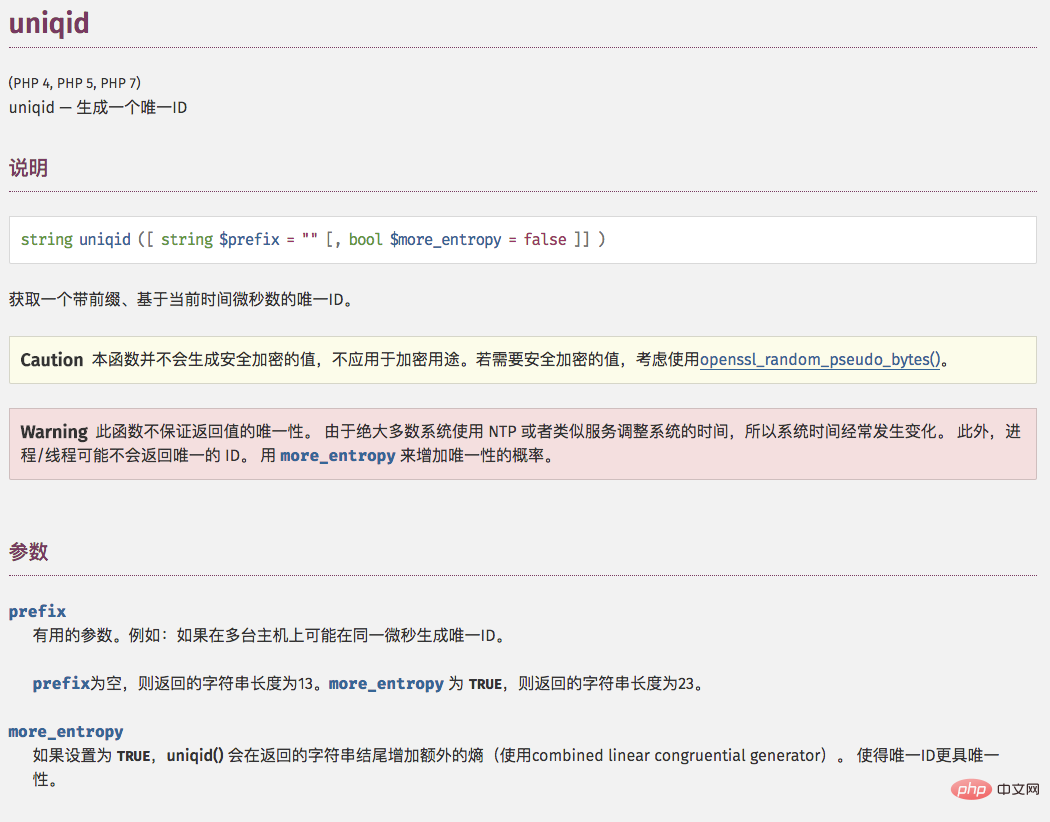Is the ID generated by PHP's uniqid function really unique?

I have recently used uniqid and have questions? What does the id generated by uniqid consist of? Is it really the only one? Under what circumstances will conflicts arise?
See from the document that the uniqid function has two parameters

The structure of uniqid
Look at the source code:
PHP_FUNCTION(uniqid)
{
...
gettimeofday((struct timeval *) &tv, (struct timezone *) NULL);
sec = (int) tv.tv_sec;
usec = (int) (tv.tv_usec % 0x100000);
... if (more_entropy) {
uniqid = strpprintf(0, "%s%08x%05x%.8F", prefix, sec, usec, php_combined_lcg() * 10);
} else {
uniqid = strpprintf(0, "%s%08x%05x", prefix, sec, usec);
}
RETURN_STR(uniqid);
}Basically understand it clearly. uniqid is composed of four parts:
prefix + sec + usec + “.” + php_combined_lcg
where prefix is the first parameter of the uniqid function. It is a string, and whatever is passed in is returned directly.
sec is the second of the current clock and usec is the millisecond, both values are obtained from gettimeofday. In other words, as long as they are on one machine, the sec and usec obtained by two PHP programs in the same millisecond are the same.
php_combined_lcg is determined by the second parameter of uniqid, which is an entropy value. It uses linear congruence to generate a random number between 0 and 1. If the second parameter is true, there is this value. If the second parameter is false, there is no value.
For example:
➜ ~ php -r 'echo uniqid("my_", true);'my_5afe9b414c2141.76621929Conclusion
So, if we simply use the uniqid() method without any parameters, this method can only guarantee a single process. are unique within the same millisecond. If using uniqid("", true). With an entropy value, it already has a random method to ensure the randomness of the generated ID. However, since linear congruence is a relatively simple algorithm for generating random numbers, the randomness may not be enough. Therefore, a more random numerical method circulated on the Internet is:
uniqid(mt_rand(), true)
Among them, mt_rand() generates random numbers. Instead of using linear congruence to generate random numbers, use the Mersenne Twister Random Number Generator (Messenne Twister Algorithm). In other words, the above id is generated by two random algorithms + timestamp. Basically, this algorithm can guarantee uniqueness to a large extent (if you want to ask about the conflict rate, it is estimated that only mathematics students can figure it out...).
The ID given above will have a period, and the length is not 128 bits. If you want to generate a uuid, you need a hash, whether it is md5 or sha1. So there is another way to generate unique codes on the Internet. (php video tutorial)
md5(uniqid(mt_rand(), true))
However, essentially, the randomness of these two methods is equal.
md5(uniqid(mt_rand(), true))-------- I personally testify that this effect is good, not heavy, but irregular----my own words
The above is the detailed content of Is the ID generated by PHP's uniqid function really unique?. For more information, please follow other related articles on the PHP Chinese website!

Hot AI Tools

Undresser.AI Undress
AI-powered app for creating realistic nude photos

AI Clothes Remover
Online AI tool for removing clothes from photos.

Undress AI Tool
Undress images for free

Clothoff.io
AI clothes remover

AI Hentai Generator
Generate AI Hentai for free.

Hot Article

Hot Tools

Notepad++7.3.1
Easy-to-use and free code editor

SublimeText3 Chinese version
Chinese version, very easy to use

Zend Studio 13.0.1
Powerful PHP integrated development environment

Dreamweaver CS6
Visual web development tools

SublimeText3 Mac version
God-level code editing software (SublimeText3)

Hot Topics
 1385
1385
 52
52
 PHP 8.4 Installation and Upgrade guide for Ubuntu and Debian
Dec 24, 2024 pm 04:42 PM
PHP 8.4 Installation and Upgrade guide for Ubuntu and Debian
Dec 24, 2024 pm 04:42 PM
PHP 8.4 brings several new features, security improvements, and performance improvements with healthy amounts of feature deprecations and removals. This guide explains how to install PHP 8.4 or upgrade to PHP 8.4 on Ubuntu, Debian, or their derivati
 How To Set Up Visual Studio Code (VS Code) for PHP Development
Dec 20, 2024 am 11:31 AM
How To Set Up Visual Studio Code (VS Code) for PHP Development
Dec 20, 2024 am 11:31 AM
Visual Studio Code, also known as VS Code, is a free source code editor — or integrated development environment (IDE) — available for all major operating systems. With a large collection of extensions for many programming languages, VS Code can be c
 7 PHP Functions I Regret I Didn't Know Before
Nov 13, 2024 am 09:42 AM
7 PHP Functions I Regret I Didn't Know Before
Nov 13, 2024 am 09:42 AM
If you are an experienced PHP developer, you might have the feeling that you’ve been there and done that already.You have developed a significant number of applications, debugged millions of lines of code, and tweaked a bunch of scripts to achieve op
 How do you parse and process HTML/XML in PHP?
Feb 07, 2025 am 11:57 AM
How do you parse and process HTML/XML in PHP?
Feb 07, 2025 am 11:57 AM
This tutorial demonstrates how to efficiently process XML documents using PHP. XML (eXtensible Markup Language) is a versatile text-based markup language designed for both human readability and machine parsing. It's commonly used for data storage an
 Explain JSON Web Tokens (JWT) and their use case in PHP APIs.
Apr 05, 2025 am 12:04 AM
Explain JSON Web Tokens (JWT) and their use case in PHP APIs.
Apr 05, 2025 am 12:04 AM
JWT is an open standard based on JSON, used to securely transmit information between parties, mainly for identity authentication and information exchange. 1. JWT consists of three parts: Header, Payload and Signature. 2. The working principle of JWT includes three steps: generating JWT, verifying JWT and parsing Payload. 3. When using JWT for authentication in PHP, JWT can be generated and verified, and user role and permission information can be included in advanced usage. 4. Common errors include signature verification failure, token expiration, and payload oversized. Debugging skills include using debugging tools and logging. 5. Performance optimization and best practices include using appropriate signature algorithms, setting validity periods reasonably,
 PHP Program to Count Vowels in a String
Feb 07, 2025 pm 12:12 PM
PHP Program to Count Vowels in a String
Feb 07, 2025 pm 12:12 PM
A string is a sequence of characters, including letters, numbers, and symbols. This tutorial will learn how to calculate the number of vowels in a given string in PHP using different methods. The vowels in English are a, e, i, o, u, and they can be uppercase or lowercase. What is a vowel? Vowels are alphabetic characters that represent a specific pronunciation. There are five vowels in English, including uppercase and lowercase: a, e, i, o, u Example 1 Input: String = "Tutorialspoint" Output: 6 explain The vowels in the string "Tutorialspoint" are u, o, i, a, o, i. There are 6 yuan in total
 Explain late static binding in PHP (static::).
Apr 03, 2025 am 12:04 AM
Explain late static binding in PHP (static::).
Apr 03, 2025 am 12:04 AM
Static binding (static::) implements late static binding (LSB) in PHP, allowing calling classes to be referenced in static contexts rather than defining classes. 1) The parsing process is performed at runtime, 2) Look up the call class in the inheritance relationship, 3) It may bring performance overhead.
 What are PHP magic methods (__construct, __destruct, __call, __get, __set, etc.) and provide use cases?
Apr 03, 2025 am 12:03 AM
What are PHP magic methods (__construct, __destruct, __call, __get, __set, etc.) and provide use cases?
Apr 03, 2025 am 12:03 AM
What are the magic methods of PHP? PHP's magic methods include: 1.\_\_construct, used to initialize objects; 2.\_\_destruct, used to clean up resources; 3.\_\_call, handle non-existent method calls; 4.\_\_get, implement dynamic attribute access; 5.\_\_set, implement dynamic attribute settings. These methods are automatically called in certain situations, improving code flexibility and efficiency.




